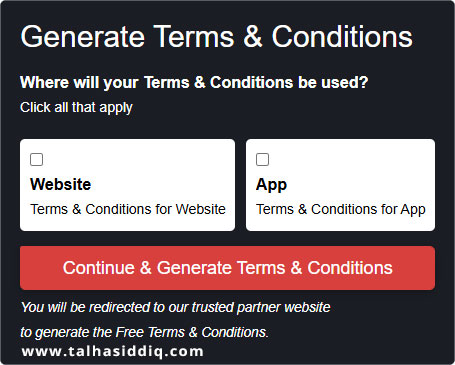The Fastest Free Terms & Condition Generator
Fill in the required details
The Free Terms and Conditions Generator by talhasiddiq.com is an easy-to-use tool to help you create customized terms and conditions for your website, blog, or business.
This tool is intended to assist you in defining the guidelines and rules for users interacting with your online presence.
Please Note: The generated content is for informational purposes only and does not constitute legal advice. Although the Terms and Conditions Generator is designed to produce a document tailored to your needs, talhasiddiq.com cannot guarantee that the generated terms and conditions will fully satisfy all legal requirements specific to your situation. For complete legal compliance, you should consult a qualified attorney.
By using the Terms and Conditions Generator, you agree that talhasiddiq.com shall not be held liable for any consequences, liabilities, or damages that may arise from the use of the generated document.

How to Use the Terms and Conditions Generator?
Step-by-Step Guide
Step 1: Start by entering all the necessary information in the fields provided.
Step 2: Double-check the information to ensure accuracy.
Step 3: Click on the “Generate Terms and Conditions” button to create your custom terms.
Step 4: Review the generated Terms and Conditions to ensure it meets your requirements.
Step 5: Copy the terms and conditions and paste them onto your website or blog.
Where do I put my privacy policy?
Privacy policies are commonly placed in the footer section of a website or blog, as this area is easily accessible from any page. Positioning your privacy policy in a prominent and consistent location, like the footer, ensures that visitors can quickly find and review it at any time. This practice not only promotes transparency but also helps build trust with your users by making important information about data handling and privacy easily accessible. It’s recommended to keep the policy in visible and intuitive locations to meet compliance requirements and enhance user experience.
What is a privacy policy?
A privacy policy is an essential document for any website, app, or business that collects personal information from users. It explains to users how their data is collected, used, and protected, helping to build trust and comply with legal requirements. Here’s what a typical privacy policy covers:
- Types of Information Collected: Specifies what personal information is gathered, such as names, email addresses, IP addresses, and other data.
- Purpose of Data Collection: Explains why the data is being collected, whether for providing services, improving user experience, marketing, or other purposes.
- Data Usage: Details how the collected information will be used, such as for communication, personalization, or analytics.
- Third-Party Sharing: States if and with whom the data will be shared, like service providers, advertising partners, or legal authorities.
- User Rights: Outlines users' rights over their data, including accessing, correcting, or deleting their personal information.
- Data Security: Describes the measures taken to protect user data from unauthorized access or breaches.
- Policy Updates: Informs users of any updates to the privacy policy and how they will be notified about changes.
Is the privacy policy generator free to use?
On talhasiddiq.com privacy policy generator is a free tool designed to help websites and blogs create their own privacy policies. Using this generator, you can easily draft a privacy policy tailored to your business needs at no cost.
Do Websites or Blogs Need a Privacy Policy?
If your website or blog collects personal data, a privacy policy is essential. Various privacy laws require websites to disclose their data collection and usage practices to users, making a privacy policy a legal necessity. Additionally, many service providers, including advertising and analytics platforms, require their users to have a privacy policy in place.
Why is a privacy policy important?
A privacy policy is crucial for any business or website that handles user data. It serves both as a legal safeguard and a tool for building trust with users by ensuring transparency in data practices. Here are some key reasons why a privacy policy is important:
- Legal Compliance: Many privacy laws, like GDPR, CCPA, and COPPA, require websites to have a privacy policy if they collect personal data. Failing to provide one can lead to fines and legal consequences.
- User Trust and Transparency: A privacy policy demonstrates that the business values user privacy and is committed to transparent data practices. Users are more likely to engage with websites that clearly explain how their data is used and protected.
- Business Credibility: Displaying a privacy policy reflects professionalism and compliance with industry standards, which enhances the credibility of the business.
- Risk Management: A well-drafted privacy policy outlines how data is stored, shared, and secured, helping the business manage potential risks associated with data breaches or misuse.
- Third-Party Requirements: Many platforms, such as advertising networks and payment gateways, require websites to have a privacy policy before using their services.
